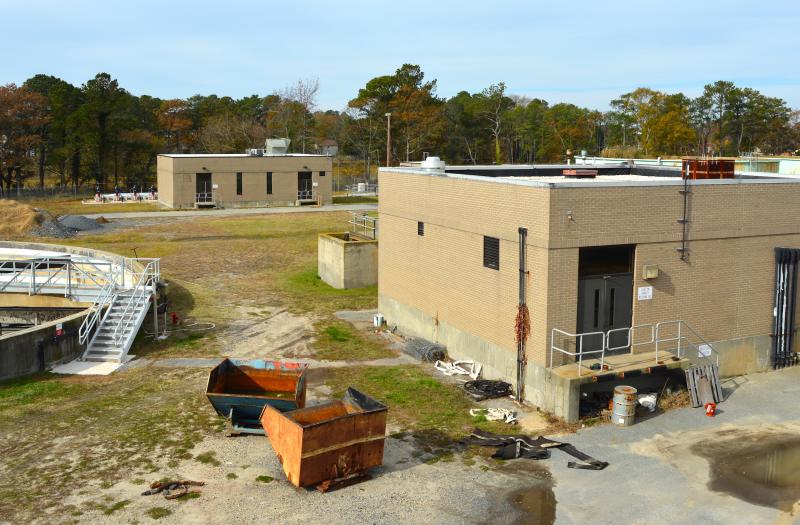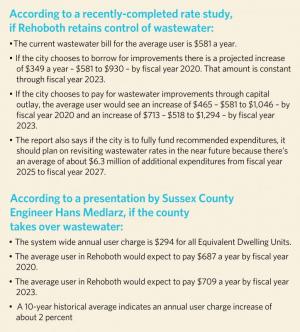Three weeks to the day after Rehoboth officials reviewed a water and sewer rate study that showed significant rate increases are needed to pay for recent and future capital improvements, Sussex County representatives presented a proposal that would see the county take over the sewer utility. That in turn, would lower future sewer rates for city customers to the tune of hundreds of dollars less per year for the average user.
During a meeting Nov. 26, Sussex County Engineer Hans Medlarz said if the county were to assume responsibility for Rehoboth’s sewer system, the expected cost for the average user would be $687 per year by fiscal year 2020. He said by fiscal year 2023, the expected cost would be $709 per year for that same user.
According to the rate study, if the county does not step in, for the city to pay for the $42 million outfall and another $24 million in proposed capital improvements the average user, by fiscal year 2020, would need to pay $930 a year if the city chose to borrow the money or $1,046 if the city chose to pay for the improvements as capital outlay. The city approved spending $6 million worth of the $24 million in August.
Medlarz said the county has resources to self-fund the future capital improvements, which means there would be no need for referendum or state revolving loans, therefore not triggering prevailing wage rates. He said future costs are also spread among all the county’s users – numbering more than 70,000 now – instead of just the Rehoboth users, numbering around 3,500.
Medlarz said unlike Rehoboth, which uses a metered rate, the county invoices all sewer customers on an Equivalent Dwelling Rate. The county’s fiscal year 2019 user charge per EDU is $294. He said 10 years of historical data shows the increase to the user charge has been a little less than 2 percent per year, but he said he doesn’t anticipate one for fiscal year 2020.
Medlarz said the remaining portion of the fiscal year 2020 bill – $392 – for Rehoboth users is associated with paying for the outfall and the $6 million Phase II.
Medlarz said the county would assume all municipal sewer-related assets, liabilities and legacy obligations if the new sewer district were approved. He said the county would not be looking for any more land than absolutely necessary to run the sewer system.
Medlarz said the county’s sewer connection charge, used to fund treatment and transmission upgrades, for fiscal year 2019 is $6,360, while the city’s is $2,346. He said this charge only applies to new construction and would be adjusted in phases to meet the county’s.
Before and during his presentation, Medlarz said the county is perfectly happy with the current wastewater arrangement with the city if the county’s proposal is not acted on.
Response from city commissioners, members of the public
Former Mayor Sam Cooper asked if the land associated with the treatment plant and pump stations could be leased instead of the county taking the title.
Medlarz said it wasn’t a big issue either way.
Commissioner Toni Sharp said she wanted to make sure the rate payers would receive at least the same level of service they receive now in emergency situations.
Medlarz said the county would be happy to have the level of service spelled out in any future documents.
Commissioner Lisa Schlosser asked about the future of the city employees who work in the wastewater department. It’s important the city not take any action that puts its employees in jeopardy, she said.
Medlarz said there would be an opportunity for those employees to maintain their jobs.
Rehoboth resident Sturgis Dodge said under the county’s system, property owners who are part-time residents would pay the same as ones who live in the city year-round.
City solicitor Glenn Mandalas asked if the $392 portion of the bill associated with the legacy debt could be negotiated, because if the county takes over the system, the outfall would presumably be used by the county system as a whole.
Medlarz said that issue was not negotiable because the new sewer district is the one using the outfall, and the new sewer district will be the one paying for it.
Commissioner Stan Mills wanted to know how long the county’s offer stood, because he said he did not want to rush into any decisions.
Medlarz said there was no deadline associated with the proposal.
At the conclusion of the meeting, Mayor Paul Kuhns said he expects to schedule a meeting in late December or early January with more information on city assets and possibly prepare an interim agreement. He said he recognized it’s a busy time of year and not many property owners are in town, but he said it was up to the commissioners to speak with constituents.
Kuhns said he’s already spoken with residents himself, and he said their response has been this should have been done yesterday.
“But they’re looking at it from a financial perspective and not taking control into account,” Kuhns said.
In an email Nov. 28, Kuhns said sewer infrastructure costs have exceeded the referendum amount passed a couple years ago because, at the time, that was the projected cost. He said since the passage of the referendum, the city’s engineer GHD has determined further improvements are needed at the plant.
As of press deadline Nov. 29, no meeting had been scheduled.
Chris Flood has been working for the Cape Gazette since early 2014. He currently covers Rehoboth Beach and Henlopen Acres, but has also covered Dewey Beach and the state government. He covers environmental stories, business stories and random stories on subjects he finds interesting, and he also writes a column called Choppin’ Wood that runs every other week. He’s a graduate of the University of Maine and the Landing School of Boat Building & Design.

















































